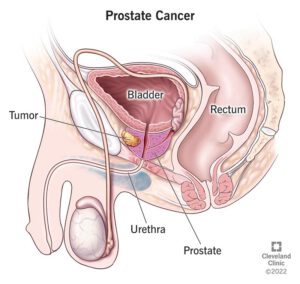You may have heard that prostrate Cancer is one of the deadly killers of men. Yes. This is true.
You may have also heard that men who have regularly sexual exercise are at lower risk at developing prostrate cancer. Is this true?
Recently, Prof. Pat Utomi was recently diagnosed with Prostrate cancer. He said it was a near death experience and encouraged men to always go for regular medical check up to determine their prostrate state.
What is prostrate cancer?
According to Dr. Mitchell Humphreys of
Mayo Clinic, prostate cancer is cancer that occurs in the prostate. The prostate is a small walnut-shaped gland in males that produces the seminal fluid that nourishes and transports sperm.
He says that Prostate cancer is one of the most common types of cancer and grow slowly and are confined to the prostate gland, where they may not cause serious harm. However, while some types of prostate cancer grow slowly and may need minimal or even no treatment, other types are aggressive and can spread quickly.
Causes
It’s not clear what causes prostate cancer but it begins when cells in the prostate develop changes in their DNA. A cell’s DNA contains the instructions that tell a cell what to do. The changes tell the cells to grow and divide more rapidly than normal cells do. The abnormal cells continue living, when other cells would die.
The accumulating abnormal cells form a tumor that can grow to invade nearby tissue. In time, some abnormal cells can break away and spread (metastasize) to other parts of the body.
Those are Risk
♦️Older age.
Your risk of prostate cancer increases as you age. It’s most common after age 50.
♦️Race.
Black people have a greater risk of prostate cancer than do people of other races. In Black people, prostate cancer is also more likely to be aggressive or advanced.
♦️Family history.
If a blood relative, such as a parent, sibling or child, has been diagnosed with prostate cancer, your risk may be increased.
♦️Obesity.
People who are obese may have a higher risk of prostate cancer compared with people considered to have a healthy weight.
Symptoms/Signs
Prostate cancer may cause no signs or symptoms in its early stages but these are noticeable.
*Trouble urinating
*Decreased force in the stream of urine
*Blood in the urine
*Blood in the semen
*Bone pain
*Losing weight without trying
*Erectile dysfunction

⭕Does frequent sexual exercise reduce the tisk?
Patricio C. Gargollo, says there is no conclusive evidence that frequent ejaculation reduces the risk of prostate cancer.
However some studies have suggested that men with a higher frequency of ejaculations may have a slightly lower risk of prostate cancer.
The good news from this comes from:
The Harvard ejaculation study
Harvard health professionals conducted a research on this using a large group of volunteers.
In 1992, 29,342 men between the ages of 46 and 81 provided information about their average number of ejaculations per month in young adulthood (age 20–29), middle age (40–49), and in the most recent year. Ejaculations included sexual intercourse, nocturnal emissions, and masturbation. The volunteers provided comprehensive health and lifestyle data every two years until the study concluded in 2000.
The scientists found no evidence that frequent ejaculations mark an increased risk of prostate cancer. In fact, the reverse was true: High ejaculation frequency was linked to a decreased risk. Compared to men who reported 4–7 ejaculations per month across their lifetimes, men who ejaculated 21 or more times a month enjoyed a 31% lower risk of prostate cancer.
When to see a doctor
Make an appointment with your doctor if you have any persistent signs or symptoms that worry you.